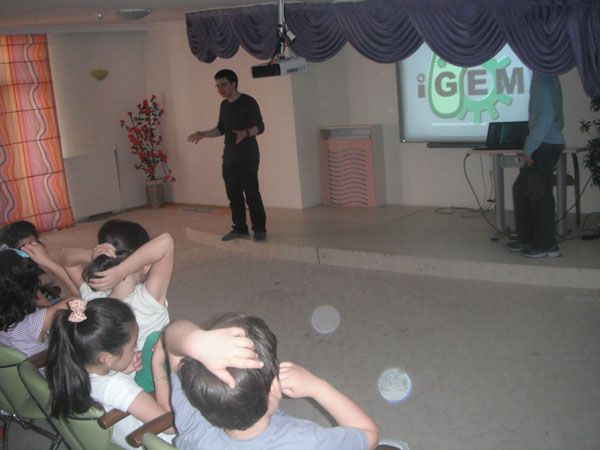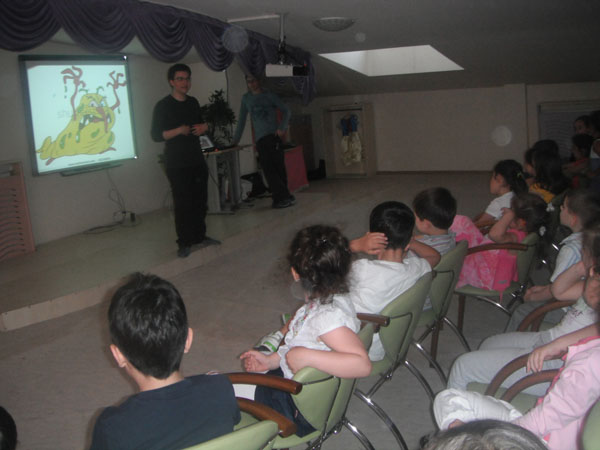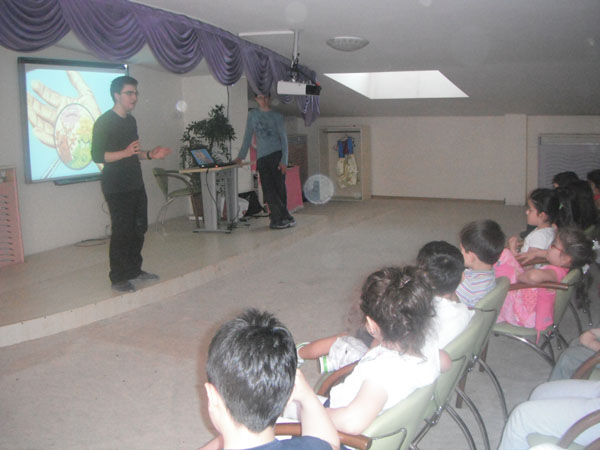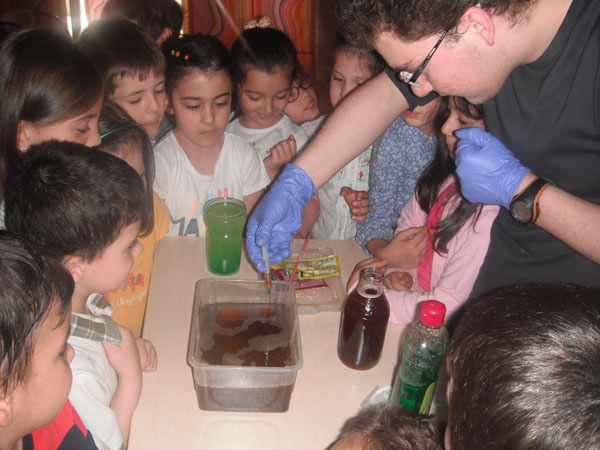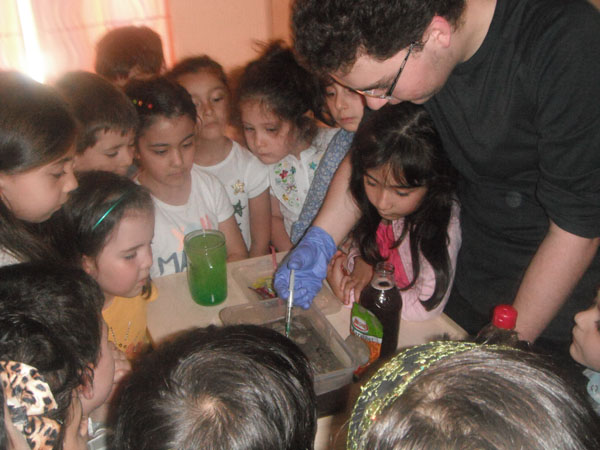Team:AUC Turkey/HumanPractices/KindergardenVisit
From 2012hs.igem.org
(Undo revision 10369 by Alihancelikcan (talk)) |
|||
| (3 intermediate revisions not shown) | |||
| Line 1: | Line 1: | ||
{{AUC_Turkey}} | {{AUC_Turkey}} | ||
| + | |||
== Our Visit to the Kindergarden == | == Our Visit to the Kindergarden == | ||
Two members of our group, Furkan Bestepe and Furkan Sacit Ceylan, visited the kindergarden Burc Child Academy. This visit was done to give education to these gifted children education on bacteria, synthetic biology. They presented iGEM to the kids. | Two members of our group, Furkan Bestepe and Furkan Sacit Ceylan, visited the kindergarden Burc Child Academy. This visit was done to give education to these gifted children education on bacteria, synthetic biology. They presented iGEM to the kids. | ||
| + | <div align="center"> | ||
| + | [[File:AUC_Turkey_KindergardenVisit005.jpg]] | ||
| + | </div> | ||
During the presentation, the first thing done was asking them what the iGEM logo looks like and how it could have any relationship with a bacteria and cogwhell. The first answer was the sun. After short explanitions, they understood what it represents and we asked how it has a bond with a bacteria. As expected, the children were not able to answer this question so we answered fort hem. We told them how synthetic biology Works. We teached them parts under the name ‘information’. They briefly learned how systems are implemented to bacteria. | During the presentation, the first thing done was asking them what the iGEM logo looks like and how it could have any relationship with a bacteria and cogwhell. The first answer was the sun. After short explanitions, they understood what it represents and we asked how it has a bond with a bacteria. As expected, the children were not able to answer this question so we answered fort hem. We told them how synthetic biology Works. We teached them parts under the name ‘information’. They briefly learned how systems are implemented to bacteria. | ||
| + | <div align="center"> | ||
| + | [[File:AUC_Turkey_KindergardenVisit002.jpg]] | ||
| + | |||
| + | [[File:AUC_Turkey_KindergardenVisit006.jpg]] | ||
| + | </div> | ||
When we asked them “What does a bacteria do?”, their answers were focused on that they were bad and that they made us sick. We teached them that there are also good-willed bacteria out there and that not all of them are harmful. | When we asked them “What does a bacteria do?”, their answers were focused on that they were bad and that they made us sick. We teached them that there are also good-willed bacteria out there and that not all of them are harmful. | ||
| Line 10: | Line 19: | ||
Also, an experiment was performed. This experiment was a simple model of our iGEM Project. In our experiment, to represent stinky bacteria we used a pot full of water with blackpepper on the surface. We added dry beverage to another pot also containing water. Each time we added more dry beverage, different colors formed and this showed that we were changing the structure of the bacterias. Then we added some detergant to the dry beverage pot to dispose the blackpepper to show how we got rid of the bad smell. The children were very suprised when the blackpeppers suddenly vanished the moment we added the detergant. | Also, an experiment was performed. This experiment was a simple model of our iGEM Project. In our experiment, to represent stinky bacteria we used a pot full of water with blackpepper on the surface. We added dry beverage to another pot also containing water. Each time we added more dry beverage, different colors formed and this showed that we were changing the structure of the bacterias. Then we added some detergant to the dry beverage pot to dispose the blackpepper to show how we got rid of the bad smell. The children were very suprised when the blackpeppers suddenly vanished the moment we added the detergant. | ||
| + | <div align="center"> | ||
| + | [[File:AUC_Turkey_KindergardenVisit003.jpg]] | ||
| + | |||
| + | [[File:AUC_Turkey_KindergardenVisit001.jpg]] | ||
| + | </div> | ||
| - | At the end of the day we asked them what they think about bacteria now. They were not bacteria haters anymore. They even wanted to have their own pet bacteria with different abilities such as hair coloring bacteria, hair growing bacteria, bacteria doing homework, | + | At the end of the day we asked them what they think about bacteria now. They were not bacteria haters anymore. They even wanted to have their own pet bacteria with different abilities such as hair coloring bacteria, hair growing bacteria, bacteria doing homework, Beyblade maker bacteria, the bacteria that kills itself, a bacteria that makes evil bacteria good bacteria and so on. |
In the end, this presentation teached these little scientists what iGEM is, that bacteria are not just something that make us sick, gave them a general idea of what synthetic biology is and how it works and that science is not boring and that it can be fun. | In the end, this presentation teached these little scientists what iGEM is, that bacteria are not just something that make us sick, gave them a general idea of what synthetic biology is and how it works and that science is not boring and that it can be fun. | ||
<forum_subtle/> | <forum_subtle/> | ||
Latest revision as of 12:59, 20 March 2013
| Sponsors | ||
|---|---|---|

|

|

|
Our Visit to the Kindergarden
Two members of our group, Furkan Bestepe and Furkan Sacit Ceylan, visited the kindergarden Burc Child Academy. This visit was done to give education to these gifted children education on bacteria, synthetic biology. They presented iGEM to the kids.
During the presentation, the first thing done was asking them what the iGEM logo looks like and how it could have any relationship with a bacteria and cogwhell. The first answer was the sun. After short explanitions, they understood what it represents and we asked how it has a bond with a bacteria. As expected, the children were not able to answer this question so we answered fort hem. We told them how synthetic biology Works. We teached them parts under the name ‘information’. They briefly learned how systems are implemented to bacteria.
When we asked them “What does a bacteria do?”, their answers were focused on that they were bad and that they made us sick. We teached them that there are also good-willed bacteria out there and that not all of them are harmful. We also gave hygiene education. This was to show how bacteria could cause illness and how we can prevent it. We told them to wash their hands, cut their fingernails, brush their teeth etc.
Also, an experiment was performed. This experiment was a simple model of our iGEM Project. In our experiment, to represent stinky bacteria we used a pot full of water with blackpepper on the surface. We added dry beverage to another pot also containing water. Each time we added more dry beverage, different colors formed and this showed that we were changing the structure of the bacterias. Then we added some detergant to the dry beverage pot to dispose the blackpepper to show how we got rid of the bad smell. The children were very suprised when the blackpeppers suddenly vanished the moment we added the detergant.
At the end of the day we asked them what they think about bacteria now. They were not bacteria haters anymore. They even wanted to have their own pet bacteria with different abilities such as hair coloring bacteria, hair growing bacteria, bacteria doing homework, Beyblade maker bacteria, the bacteria that kills itself, a bacteria that makes evil bacteria good bacteria and so on. In the end, this presentation teached these little scientists what iGEM is, that bacteria are not just something that make us sick, gave them a general idea of what synthetic biology is and how it works and that science is not boring and that it can be fun.
<forum_subtle/>
 "
"

